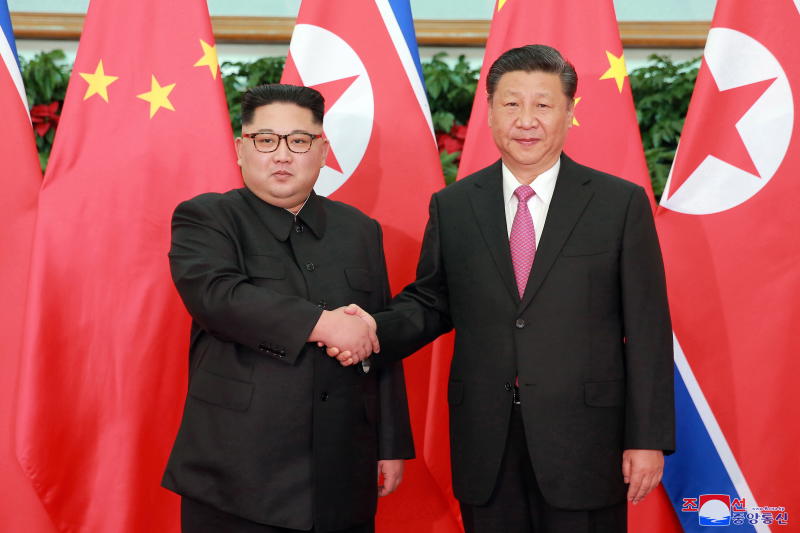North Korea's Kim Jong Un will seek China's mediation with the US during Xi Jinping's visit, says defector
Sign up now: Get insights on Asia's fast-moving developments

North Korean leader Kim Jong-un (left) shakes hands with Chinese President Xi Jinping during their meeting in Dalian, China, on May 8, 2018.
PHOTO: EPA-EFE
Follow topic:
TOKYO - North Korean leader Kim Jong Un will be asking Chinese President Xi Jinping for help to mediate the current nuclear deadlock between Pyongyang and Washington, high-profile North Korea defector Thae Yong Ho said on Thursday (June 20).
Mr Thae, who was in London as the North's deputy ambassador to Britain when he defected in 2016 with his wife and two sons, told a news conference that he saw Mr Xi's visit as part of a new grand strategy by Mr Kim after his failed Hanoi summit with United States President Donald Trump in February.
Mr Trump and Mr Xi will sit down for an "extended meeting" in Osaka next week on the sidelines of the Group of 20 leaders' summit, primarily to thrash out their differences on trade but with North Korea likely to be high on the agenda, following the Chinese President's visit.
"Kim is trying to use Xi's visit to deliver his new approach to the US side," Mr Thae said in Tokyo, where he is on a book tour to promote the Japanese release of Cryptography From The Third-Floor Secretariat that was first published in Korean last year.
"Xi may deliver this new offer directly to Trump and now it will be up to Trump to decide whether he would accept this new proposal or not."
At the heart of the current impasse is how far Pyongyang should go in giving up its nuclear facilities before Washington begins to lift sanctions.
Mr Thae posited that Mr Kim might try to pull the wool over Mr Trump's eyes by focusing his attention on the five nuclear uranium enrichment facilities that Mr Trump raised at the Hanoi summit - so as to avoid any discussion on the already-made stock of nuclear material and ballistic missiles.
"If Kim succeeds in convincing Trump to make a deal on past nuclear facilities and succeeds in keeping the current nuclear missiles, then it would mean to North Korea that it can be accepted as a new nuclear state in the region," he said.
During the wide-ranging news conference, Mr Thae said that three principles have been ingrained in North Korean diplomats by the Kim regime for decades: the US will not attack North Korea, given the human cost involved; China will never give up on North Korea, regardless of what it does; and regardless of the incentives offered, North Korea will not give up nuclear weapons.
And achieving the legitimacy of being a nuclear state has been the basis of Mr Kim's recent diplomatic push, Mr Thae said, adding that he does not see the North Korean leader backing down easily. To this end, he stressed that the current sanctions regime must be tightened further.
"While the sanctions are creating a lot of difficulties, (they) will not be enough to force him to give up his nuclear programme," he said, adding that Mr Kim can endure the current sanctions.
He called it a "paradox" that Mr Kim seems to be rewarded for not conducting any nuclear or long-range missile tests with no further sanctions, although the missiles are still operational.
On this point, he also accused China and Russia of "playing games" with United Nations sanctions by finding loopholes that allow them to channel funds to prop up Mr Kim's regime.
A moratorium on nuclear or ballistic missile tests also suits China, Mr Thae said, as Beijing can then argue for Washington to not conduct any joint military exercises or impose any more sanctions.
"The Chinese interests are aligned with North Korea's policy," he said.
Separately, Mr Thae also said he does not see any meeting between Mr Kim and Japanese Prime Minister Shinzo Abe anytime soon.
Mr Abe, one of the most hawkish world leaders on North Korea, has recently made a policy U-turn and vowed to meet Mr Kim without any preconditions to seek a breakthrough to the longstanding abductions issue.
"North Korea thinks Japan should do something in advance to show its sincerity of implementing the Pyongyang Declaration (between Japan and North Korea)," he said, referring to the 2002 document that called for the early normalisation of relations that will unlock economic aid.
"The question is how much and what and when Mr Abe can deliver to make that summit happen."
Mr Thae added that Mr Kim's primal fear was not that of external regime change but of internal regime collapse, which he sees as possible in North Korea's march towards capitalism, given rising numbers of free markets where citizens are openly selling products from the South.
"The younger generation do not have any loyalty to the North Korean juche ideology," he said, given their bread-and-butter concerns of making ends meet and putting food on the table. Juche refers to the state communist philosophy that emphasises political, economic and military self-reliance.
"If Kim Jong Un cannot prevent the inflow of outside information, like South Korea movies or dramas, then one day North Korea's system can collapse. Already, a lot of smuggling is happening," he said.
"I'm in my late 50s. If I'm able to live another 20 to 30 years, I think I will be able to walk back to my hometown," he said. "I will devote the rest of my life to accelerating the process of this internal system collapse by telling the true nature of the North Korean system."

